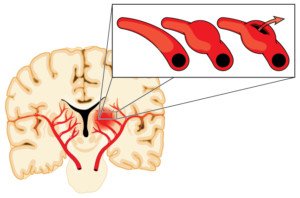It’s not impossible for a brain aneurysm to cause your tongue to twitch.
Though tongue twitching is far more likely to be caused by ALS than a brain bleed, there are things to consider when it comes to what feels like your tongue twitching for no apparent reason.
What is a brain aneurysm?
This is when a blood vessel in the brain is abnormally dilated or “ballooned up.”
The walls of this bulging area are weak and thus prone to a rupture.
The survival rate for a ruptured cerebral aneurysm is 40 percent.
About 66 percent of survivors sustain permanent neurological impairment.
The presentation of a ruptured brain aneurysm is the sudden thunderclap headache (the worst head pain you can imagine) which may also be accompanied by one or more of the following:
Dilated pupils, double vision, a drooping eyelid, a stiff neck, nausea/vomiting, confusion, seizures and loss of consciousness.
Common symptoms of an unruptured cerebral aneurysm include visual problems, one-sided facial numbness or weakness, pain near an eye and difficulty with speech.
The presentation of a brain aneurysm can be variable, says Atif Zafar, MD, medical director of St. Michaels Hospital in Toronto, Ontario, and former director of the stroke program at University of New Mexico Hospital.

Brain aneurysm. Shutterstock/Blamb
Dr. Zafar explains, “Imagine blood oozing rapidly out of the ruptured aneurysm into the brain. The bleed typically settles around the brainstem.
“Here is the confusing aspect: Tongue, face, swallowing, breathing — all these activities are controlled by the brainstem.”
From the brainstem exit the 12 cranial nerves. The 12th one is called the hypoglossal, and it’s this nerve that controls tongue movement.
Dr. Zafar continues, “So theoretically, tongue twitching can be something associated with a brain bleed.”
An unruptured brain aneurysm, though, cannot cause any tongue fasciculations.
“However, isolated tongue twitching that happens on and off without any other symptoms like headache, vision changes, neck stiffness would very unlikely be related to brain aneurysm or a stroke,” says Dr. Zafar.
Dr. Zafar is author of the book, “Why Doctors Need to Be Leaders.” His interests include vascular and endovascular neurology, and the neurosciences.
 Lorra Garrick has been covering medical, fitness and cybersecurity topics for many years, having written thousands of articles for print magazines and websites, including as a ghostwriter. She’s also a former ACE-certified personal trainer.
Lorra Garrick has been covering medical, fitness and cybersecurity topics for many years, having written thousands of articles for print magazines and websites, including as a ghostwriter. She’s also a former ACE-certified personal trainer.
.











































